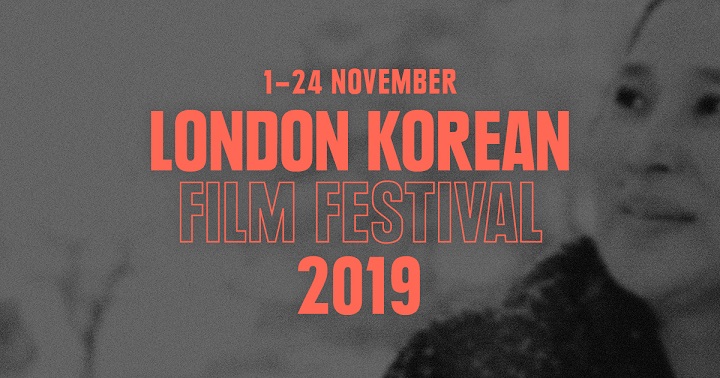London Korean Film Festival 2019 Celebrates ‘A Century of Korean Cinema’
The London Korean Film Festival (LKFF) has launched its full programme of films and events for the upcoming 14th edition, taking place from 1st-14th November in London before embarking on the annual tour 18th-24th November. The Special Focus, and much of this year’s festival programme, will highlight the historic milestone of 100-years of Korean cinema along with an exciting mix of UK and International premieres, guests and events across a diverse set of strands; Cinema Now, Women’s Voices, Documentary, Hidden Figures: Ha Gil-jong, Artist Video, Animation and Mise-en-scène Shorts.
Korean cinema continues to excite global audiences with a steady stream of titles that satisfy both artistic and commercial appetites. This year alone has seen Bong Joon-ho win the Palme D’Or with Parasite at the Cannes Film Festival and Lee Chang-dong’s Burning (2018) released to critical praise in UK cinemas, while Train to Busan (Yeon Sang-ho, 2016), The Handmaiden (Park Chan-wook, 2016) and Little Forest (Lim Soon-rye, 2018) have all found recent success. Now, with 2019 marking the centenary of Korean cinema, the LKFF will shine a light into the past to offer insight into the full and fascinating history of a groundbreaking national cinema that has lead up to the acclaimed hits of today.

This celebration of Korea’s cinematic history is established with the festival’s Opening Gala on 1st November, The Seashore Village (1965). With the LKFF now in its 14th year, this marks the first time a retrospective title has been selected to open the festival. Newly restored, and presented in the UK for the very first time, the film tells the story of a young woman, Hae-soon, living in a village heavily populated by women who have lost their husbands at sea. A vivid portrait of the hardships faced by the women of the village and their methods of coping through sisterly comradeship and an understanding of the natural world around them, the film features striking monochrome cinematography. Courtesy of veteran director Kim Soo-yong, now in his 90s, who made his film debut in 1958 with A Henpecked Husband and went on to make over 100 films in a long and distinguished career, the revered filmmaker will be present on opening night to discuss The Seashore Village, his life in film and 100 years of Korean cinema. Continuing the festival’s championing of new independent cinema, the LKFF will hold its Closing Gala on 14th November with new directing team Lee Jihyoung and Kim Sol’s Scattered Night (2019, UK Premiere). Told through the eyes of two young children who must wait as their separating parents messily make their way towards a decision on which of them will take which child post-divorce. Minimalist and free of melodrama, the film offers an intimate and heart-breaking child’s eye view of a crumbling family dynamic.
The Special Focus strand, A Century of Korean Cinema, follows on from a landmark collaboration with the British Film Institute and the Korean Film Archive earlier this year, ‘Early Korean Cinema: Lost Films from the Japanese Colonial Period’ which presented the country’s oldest surviving films, produced during the turbulent period of occupation during the Second World War. The LKFF 2019 will continue where that acclaimed season ended, launching into a full programme of cinema spanning the decades and featuring works from Korea’s visionary filmmakers of the past and leading up to the early works of prominent directors spearheading the nation’s cinema today.
Special Focus: A Century of Korean Cinema is a unique programme featuring pivotal titles exploring the nation’s rich cinematic history and incorporating UK and European premiere film screenings of culturally-important retrospective titles, many newly restored, and introduced by leading filmmakers and critics from Korea and the UK, along with Q&As, forums, workshops and unique events.
The oldest film to feature in the Special Focus programme is Yun Yong-gyu’s touching melodrama A Hometown in Heart (1949) which follows an orphaned young monk as he traverses temple life while longing for the return of his mother. Moving into the 1950s, two titles are presented: one of which shows the harsh reality of the Korean war, while the other shines a light on the society left in its wake. Lee Kang-cheon’s Piagol (1955) finds a group of communist fighters waging war among mountain villages under the harsh leadership of a zealous commander. With its nuanced depiction of communists the controversial film was originally banned for a perceived pro-communist message. From legendary director Shin Sang-ok (who would later be kidnapped and forced to make films for the North Korean leader Kim Jong-il) comes The Flower in Hell (1958), set against the back-drop of occupied post-war Korea. Disaster befalls the lives of prostitute Sonya as she schemes to find a new life for herself by seducing the younger brother of her hustler boyfriend Young-sik who makes money by stealing from the US military.
